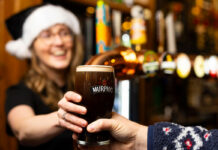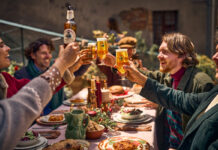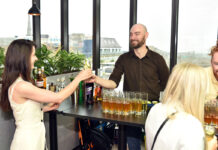Category is expected to be just as lively in 2017 as it has been this year

IT’S been another eventful year for beer in Scotland’s pubs, with a wider selection of products making their way onto bar tops and into fridges than ever before.
And with bar and pub customers seemingly interested in trying new beers, it’s unlikely that 2017 will be any less eventful.
Brewers reckon the best way to capitalise on this in the new year will be to stock a varied range of beers that balances lesser-known craft products with recognisable names, as well as ensuring staff are knowledgeable and articulate about the beers they are selling.
“The vast range of beers now available to pub-goers, combined with the category’s boom in popularity, demonstrates that variety is key when it comes to choosing what to stock,” said Liam Newton, vice president of marketing at Carlsberg UK.
It’s important to stock a range of different beer styles at different price points.
This was echoed by Andrew Turner, category and trade marketing director, on-trade, at Heineken.
Turner said that, with such a broad range of different beer drinkers visiting the on-trade, “it’s important to stock a range of different styles at different price points to ensure you’re catering for all tastes and preferences”.
And Stewart Brewing co-founder Jo Stewart predicted that the large number of breweries now in operation across Scotland will ensure that 2017 will be “a super competitive environment” in beer terms.
Quality, said Stewart, will be more important than ever.
“Really focus on quality and knowledge,” she said.
“If the beer quality is right the customers will keep coming back.”
Gerald Michaluk of Arran Brewery agreed.
He stressed the importance of stocking a range of premium quality craft products with genuine provenance.
“With so much competition being honest about the beers on offer and sensible pricing is key,” he said. “And of course staff knowledge is critical – don’t ask your staff to sell beers they don’t know the story behind.”
Katerina Podtserkovskaya, head of Guinness activation in the on-trade at Diageo, also stressed the importance of quality when selecting the right products.
Licensees have never been in a better position to introduce new products.
She said: “Consumers are seeking a richer value or experience from what they consume. They are interested in the stories, ingredients and provenance of products and this is a trend we are seeing across food and drink as a whole, and it is influencing purchase decisions.
“Within beer we are seeing the impact of this trend, with growth in premium beers attributed to the consumer needs of diversity, choice and exploration.”
With many customers keen to find new beers to try, licensees should consider reviewing their range regularly, according to Alan Hay, on-trade sales director at Tennent’s.
“Licensees should regularly review their product range to understand what works best for them as a business,” said Hay.
“With the level of choice increasing, landlords have never been in a better position to introduce new products to their customers. And in turn, many customers expect a wide range of products to choose from when they go to the bar.”
The new year is said to be an ideal time to trial new beers.
Tara Karimian, brand manager at McEwan’s Beers, recommended licensees and bar managers speak to their customers and suppliers to try and gauge which types of beers might prove popular, before introducing products on a trial basis.
“In January, when it’s usually quiet, this actually can help encourage people into pubs and bars if they know there will be something new each week,” said Karimian.
The outlets making the most of beer in 2017 will be those that manage to get their customers enthused about the category, said brewers, and that’s about more than selecting the right products.
Simon George, managing director of Budvar UK, said, much like in other areas of hospitality, pubs need to put the visitor experience “at the centre of the offer” with regard to beer.
“We recommend applying this mindset to the pub visit, for beer specifically this means staff training, beer menus, seasonal ranging and beer and food matching,” said George.
These areas were also highlighted by Newton, at Carlsberg UK, who said it is important operators work to “drive interest in a venue’s beer offering”.
Communicating which beers are available in an outlet is an essential, though often overlooked, aspect of promoting beer, according to Newton.
He said: “Beer typically represents a large proportion of a venue’s sales, but it can often be an afterthought in terms of display.
“A beer menu, or even simple chalkboards that showcase the range, are fantastic ways to exhibit the variety of beers on offer.”























